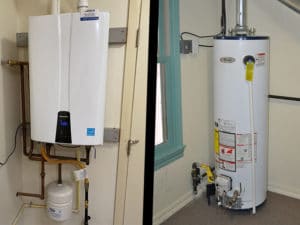The Most Common Odour Causes
Metallic Smell
If the tap water has a metallic smell (or taste) to it, the most common cause is usually the water supply pipes. Old pipes are made from iron or zinc, and their inner coating might be wearing off, causing the water to leech some of the metal. Since the supply lines are constantly pressurized, the water spends more time in contact with the pipes, accumulating more metal. Therefore, it’s not uncommon for fixtures that haven’t been used in a while to have smellier water. However, you should still have the pipes checked out by a plumber. In severe cases, the pipes will rust from the water exposure and might break. The metallic odour usually won’t be a major health hazard, unless you live in an old house that still has the original lead pipes installed. In that case, you’re probably best off replacing the entire plumbing system to bring it up to modern standards and codes.
Rotten Eggs Smell
Musty or Mouldy Smell
Salty Smell or Taste
How to Sanitize the Water Heater
- Turn off the water heater, unplug it, and turn off the control switch (for gas heaters, turn it to Pilot).
- Close the water inlet valve.
- Open a nearby hot water faucet and the pressure valve. Drain enough water to allow for an adequate amount of hydrogen peroxide to be poured in.
- Remove and inspect the anode rod. If it’s corroded, replace it. In some cases, this can solve the smell on its own.
- Pour in a pint (0.568 litres) of 3% hydrogen peroxide solution for every 40 gallons (181 L) of water in the heater. For example, you’ll need about half a pint for an 80L tank.
- Open the water inlet valve and let the tank fill up.
- Leave the peroxide to sit for about three hours.
- Flush the water heater entirely. Repeat this process after 15 minutes.
- Turn on the water heater again and resume normal operation.






